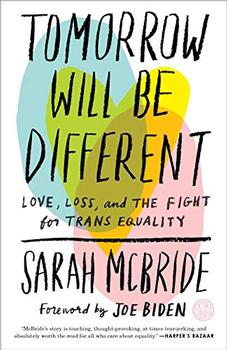Summary | Excerpt | Reading Guide | Reviews | Beyond the book | Read-Alikes | Genres & Themes | Author Bio

Love, Loss, and the Fight for Trans Equality
by Sarah McBrideSarah McBride knew from childhood that she was a girl, despite not being assigned that gender at birth. Growing up in a leafy Delaware suburb, McBride recounts her childhood as mimicking Leave it to Beaver because of the tight-knit community she grew up in, full of traditional nuclear families. Fascinated by history and politics, she was fortunate to enjoy opportunities for political involvement, such as campaign organizing and speechwriting, even before college.
But by the time McBride was a senior at American University and student body president, the pain of not living as the gender she truly identified with became overwhelming. It was during this time that she came out as a transgender woman. Her discussions with her family, academic colleagues and political figures—all of whom provided a groundswell of support—are poignantly described, with clear explanations of what it means to be a transgender person.
McBride explains, "Increasingly, we are coming to grips with the reality that the sex someone appears to be at birth does not dictate their gender identity. It is this trend that links the fight for gender equity with the fight for gay rights with the fight for trans equality: ending the notion that one perception at birth…should dictate how we act, what we do, whom we love, and who we are." The conversational yet insightful tone demonstrates her years of experience with public communications and policy speeches.
She goes on to recount her transition, the process of looking like and living as a woman. She addresses aspects of life that cisgender people (those who identify with the gender assigned them at birth) rarely reflect upon, such as names and forms of identification.
In 2012, McBride achieved her childhood dream of working in the White House, becoming the first openly transgender intern in the Obama administration. She then joined the front lines of legislative efforts in Delaware to pass marriage equality and gender identity nondiscrimination bills, despite the reluctance of many state representatives to vote on contentious social issues twice in one year. The process of rounding up votes and facing down protesters is told with both detail and momentum, culminating in the passage of both bills in 2013.
McBride's memoir recounts these important social and political shifts, but it's also a personal narrative and a love story—featuring her and the transgender man she fell in love with, Andy Cray. Yet just as they were accruing legal victories and personal accomplishments, Andy was diagnosed with cancer and McBride became his caretaker at the tender age of 23. Through surgery, chemotherapy, and radiation treatments, they persevered through painful challenges that couples much older than them struggle to deal with. Even with aggressive treatment, however, Andy's cancer spread and he passed away in 2014, only days after he and McBride had married.
Pushing through the grief, McBride eventually returned to LGBTQ advocacy, and by giving a speech at the 2016 Democratic National Convention, became the first transgender person to do so on a national stage. These efforts, as well as her lobbying against notorious "bathroom bills," particularly in North Carolina, brought her national attention and made McBride a role model for transgender children struggling to live as their true selves.
Despite the tragic loss of her husband and the rollback of LGBTQ rights under the Trump administration, McBride maintains her positivity and hope for the future. Significantly, she is aware of her privilege as a white person from the upper socioeconomic strata of society. She repeatedly explains how her race and economic status have given her the ability to speak out and be an advocate, and that those statuses confer upon her a degree of safety that many transgender people, particularly of color, do not have.
Because she is aware of her opportunity to effect change, McBride remains motivated in her activism, and she ends her memoir with an uplifting message to keep fighting for intersectional equality and legal protections for all Americans. It's a message as moving and brave as McBride's story itself.
![]() This review was originally published in The BookBrowse Review in April 2018, and has been updated for the
March 2019 edition.
Click here to go to this issue.
This review was originally published in The BookBrowse Review in April 2018, and has been updated for the
March 2019 edition.
Click here to go to this issue.

If you liked Tomorrow Will Be Different, try these:

by Caro De Robertis
Published 2025
Award-winning novelist Caro De Robertis offers a first-of-its-kind, deeply personal, and moving oral history of a generation of queer and trans elders of color, from leading activists to artists to ordinary citizens to tell their stories of breathtaking courage, cultural innovations, and acts of resistance, all in their own words.

by Emily St. James
Published 2025
An unforgettable and heartwarming book-club debut following a trans high school teacher from a small town in South Dakota who befriends the only other trans woman she knows: one of her students.
Your guide toexceptional books
BookBrowse seeks out and recommends the best in contemporary fiction and nonfiction—books that not only engage and entertain but also deepen our understanding of ourselves and the world around us.